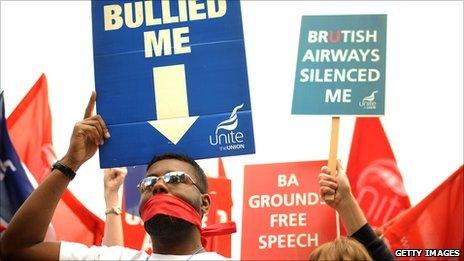BA strike: Re-building relations will take time
- Published

The dispute, which lasted almost two years, became increasingly bitter
The war is over, now it's time to re-build the peace. That is one BA employee's verdict on what he described as a momentous day for the airline and its staff.
For so long have cabin crew been in conflict with their management, they can scarcely believe that the hostilities may be about to end, says one employee.
Dave - not his real name because he is not allowed to talk to the media - attended the Unite union meeting on Thursday where between 1,000-1,500 members heard details of the latest peace proposal.
"There was a tremendous atmosphere of optimism. We wanted the deal to be the end of all the conflict," said Dave, who has worked as cabin crew for 17 years.
It was a very emotional meeting, he said, because people have spent almost two years fearing for their jobs and facing confrontation with colleagues who refused to strike.
But even though the vast majority of the meeting voted to approve the agreement there was still a sizeable group who voted 'no' or abstained, he said.
"There are still a lot of angry people; people who have been bullied or harassed; people who remain cynical of management; people who still believe attack is the best form of defence."
Most of the meeting have yet to see the fine print in the agreement thrashed out between Unite and BA.
But of the ten main points presented to the audience, Dave believes every one will get the support of the majority of cabin crew.
He said: "People feel there is enough here to win everyone around. We do not feel like we have won. We simply wanted to protect what we had."
And what has changed to allow a deal this time, when so many previous attempts at compromise collapsed? "Personalities and politics," he said.
Dave is critical of former BA chief executive Willie Walsh, who he believes wanted to break the unions through a confrontation with cabin crew.
Resentment
Indeed, Dave said many staff fear that Mr Walsh, who now runs the merged BA-Iberia group IAG, "could still come back into the equation" to scupper the agreement.
He agrees that this is unlikely, but says the concern is real, such is the resentment towards Mr Walsh.
The atmosphere at BA changed markedly when Keith Williams took over as chief executive. "Many people felt they knew him; had met him at meetings. He is different to Willie Walsh."
But although relations with management may be improving, divisions between colleagues remain.
He said it will be difficult to forgive staff who refused to back the strike and stepped in to act as replacement cabin crew when union members walked out.
"There is a lot of dislike, even hatred towards some staff in other parts of the airline," he said.
He says there is particular "hatred" - yes, hatred - of pilots. "They refused to support the strike and some were scabs," Dave said. "I'm not sure the trust can ever recover."
Flashpoint
There is also the issue of what to do about the 13 staff who were sacked, and dozens more who were disciplined, for incidents that erupted during months industrial unrest.
As part of the new deal, their cases will be heard by the arbitration service Acas, with the body's ruling binding on BA and Unite.
Dave said it is still a potential flashpoint. "We want them re-instated. It is part of any deal."
But then again, he believes that the incidents were "so trivial and unfair... part of BA's bullying" that the employees will get their jobs back.
"But we do not want to leave our colleagues behind," he said.
It is a reminder that amid all the optimism, this dispute is not quite over yet.
- Published12 May 2011
- Published12 May 2011